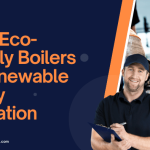Table of Contents
- Introduction
- Overview of Eco-Friendly Boiler Regulations
- Key Regulations in 2024
- The Role of Renewable Energy
- Incentives for Compliance
- FAQs
- Conclusion
Introduction
As we step into 2024, the importance of eco-friendly boiler regulations has never been clearer. With climate change impacts becoming increasingly visible, governments and organizations worldwide are taking significant steps to ensure that heating systems contribute positively to the environment. This article will guide you through the essential eco-friendly boiler regulations you need to be aware of this year, helping you stay compliant while doing your part for the planet.
As awareness of climate change grows, regulations are evolving to meet the challenges of sustainability.
Overview of Eco-Friendly Boiler Regulations
Eco-friendly boiler regulations are designed to minimize the environmental impact of heating systems. These regulations often focus on improving energy efficiency, reducing harmful emissions, and promoting the use of renewable energy sources. In 2024, several key regulations will come into play, shaping the way boilers are manufactured, installed, and operated.
Understanding these regulations is crucial for both compliance and environmental responsibility.
Key Regulations in 2024
Energy Efficiency Standards
Energy efficiency is at the forefront of eco-friendly boiler regulations. In 2024, new standards will require boilers to achieve higher efficiency ratings. The Energy-related Products Directive (ErP) in the EU mandates that all new boilers must achieve a minimum efficiency of 92% for gas boilers and 90% for oil boilers.
| Boiler Type | Minimum Efficiency Requirement |
|---|---|
| Gas Boilers | 92% |
| Oil Boilers | 90% |
| Biomass Boilers | 85% |
Higher efficiency ratings not only comply with regulations but also save consumers money on energy bills.
These standards are not just about compliance; they also mean lower energy costs for consumers and a reduced carbon footprint. For more details on energy-efficient options, consider reading about the Top 5 Energy Efficient Boiler Types for 2024.
Emissions Limits
Another critical aspect of eco-friendly boiler regulations is emissions limits. The Clean Air Act in the United States and similar regulations in other countries set stringent limits on nitrogen oxides (NOx) and particulate matter emissions. In 2024, these limits will tighten further, pushing manufacturers to innovate cleaner technologies.
For example, boilers will be expected to emit no more than 30 mg/kWh of NOx, a significant reduction from previous years. Compliance with these limits not only helps in improving air quality but also aligns with global efforts to combat climate change. For insights on specific boiler types and their emissions performance, see Top 5 Benefits of Condensing Boilers You Should Know.
The transition to cleaner technologies is not just an obligation; it’s an opportunity for innovation in the heating industry.
The Role of Renewable Energy
One of the most exciting developments in boiler regulations is the push towards incorporating renewable energy sources. In 2024, regulations will encourage the integration of solar thermal systems and heat pumps with conventional boilers. This hybrid approach can significantly enhance energy efficiency and reduce reliance on fossil fuels.
For instance, the UK’s Renewable Heat Incentive (RHI) program provides financial support for installing renewable heating systems. By combining a traditional boiler with a renewable energy source, homeowners can benefit from both lower energy bills and government incentives. To explore eco-friendly boiler options, check out the Top 5 Eco-Friendly Boilers for Sustainable Heating.
Integrating renewable energy sources not only boosts efficiency but also helps combat climate change.
Incentives for Compliance
To encourage compliance with these new regulations, various governments are offering incentives. These can include tax credits, grants, and rebates for upgrading to eco-friendly systems. For example, the U.S. Department of Energy offers tax credits for energy-efficient home improvements, including high-efficiency boilers.
Potential incentives include:
- Tax Deductions: Homeowners may claim deductions for purchasing energy-efficient boilers.
- Rebates: Utility companies often provide rebates for upgrading to high-efficiency systems.
- Grants: Some local governments offer grants for the installation of renewable energy systems.
Incentives play a crucial role in making eco-friendly options more accessible to homeowners.
These incentives not only ease the financial burden of compliance but also promote a culture of sustainability. For more on financial support options, refer to Top Government Incentives for Eco-Friendly Boilers in 2024.
FAQs
Q1: What are eco-friendly boilers?
A1: Eco-friendly boilers are heating systems designed to minimize environmental impact through improved energy efficiency and reduced emissions.
Q2: How can I ensure my boiler complies with the new regulations?
A2: Consult with a licensed heating contractor who is knowledgeable about the latest regulations and can recommend compliant systems.
Q3: What happens if I don’t comply with the regulations?
A3: Non-compliance can result in fines and may also affect your ability to sell your property.
Q4: Are there any financial benefits to upgrading my boiler?
A4: Yes! Upgrading can lead to lower energy bills, and you may qualify for various incentives that can offset the cost of the new system.
Staying informed and proactive is key to navigating the evolving landscape of boiler regulations.
Conclusion
Staying informed about eco-friendly boiler regulations in 2024 is crucial for homeowners and businesses alike. By understanding the energy efficiency standards, emissions limits, and the role of renewable energy, you can make informed decisions that benefit both your wallet and the environment. With various incentives available, there has never been a better time to invest in an eco-friendly boiler system. Together, we can contribute to a more sustainable future.
For more information on boiler regulations and options, check out Energy.gov and EPA.gov.
This comprehensive guide equips you with the knowledge necessary to make environmentally responsible decisions in 2024.





